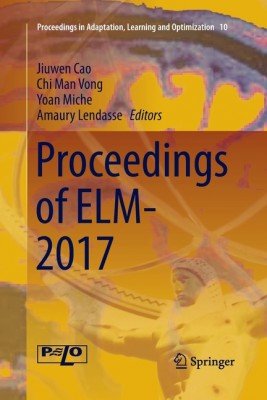| Proceedings of Elm-2017 Softcover Repri Edition Contributor(s): Cao, Jiuwen (Editor), Vong, Chi Man (Editor), Miche, Yoan (Editor) |
|
 |
ISBN: 3030131823 ISBN-13: 9783030131821 Publisher: Springer OUR PRICE: $208.99 Product Type: Paperback - Other Formats Published: December 2019 |
| Additional Information |
| BISAC Categories: - Computers | Intelligence (ai) & Semantics - Technology & Engineering | Engineering (general) |
| Dewey: 006.3 |
| Series: Proceedings in Adaptation, Learning and Optimization |
| Physical Information: 0.73" H x 6.14" W x 9.21" (1.08 lbs) 340 pages |
| Descriptions, Reviews, Etc. |
| Publisher Description: This book contains some selected papers from the International Conference on Extreme Learning Machine (ELM) 2017, held in Yantai, China, October 4-7, 2017. The book covers theories, algorithms and applications of ELM. Extreme Learning Machines (ELM) aims to enable pervasive learning and pervasive intelligence. As advocated by ELM theories, it is exciting to see the convergence of machine learning and biological learning from the long-term point of view. ELM may be one of the fundamental learning particles' filling the gaps between machine learning and biological learning (of which activation functions are even unknown). ELM represents a suite of (machine and biological) learning techniques in which hidden neurons need not be tuned: inherited from their ancestors or randomly generated. ELM learning theories show that effective learning algorithms can be derived based on randomly generated hidden neurons (biological neurons, artificial neurons, wavelets, Fourier series, etc) as long as they are nonlinear piecewise continuous, independent of training data and application environments. Increasingly, evidence from neuroscience suggests that similar principles apply in biological learning systems. ELM theories and algorithms argue that "random hidden neurons" capture an essential aspect of biological learning mechanisms as well as the intuitive sense that the efficiency of biological learning need not rely on computing power of neurons. ELM theories thus hint at possible reasons why the brain is more intelligent and effective than current computers.
This conference will provide a forum for academics, researchers and engineers to share and exchange R&D experience on both theoretical studies and practical applications of the ELM technique and brain learning.
It gives readers a glance of the most recent advances of ELM.
|